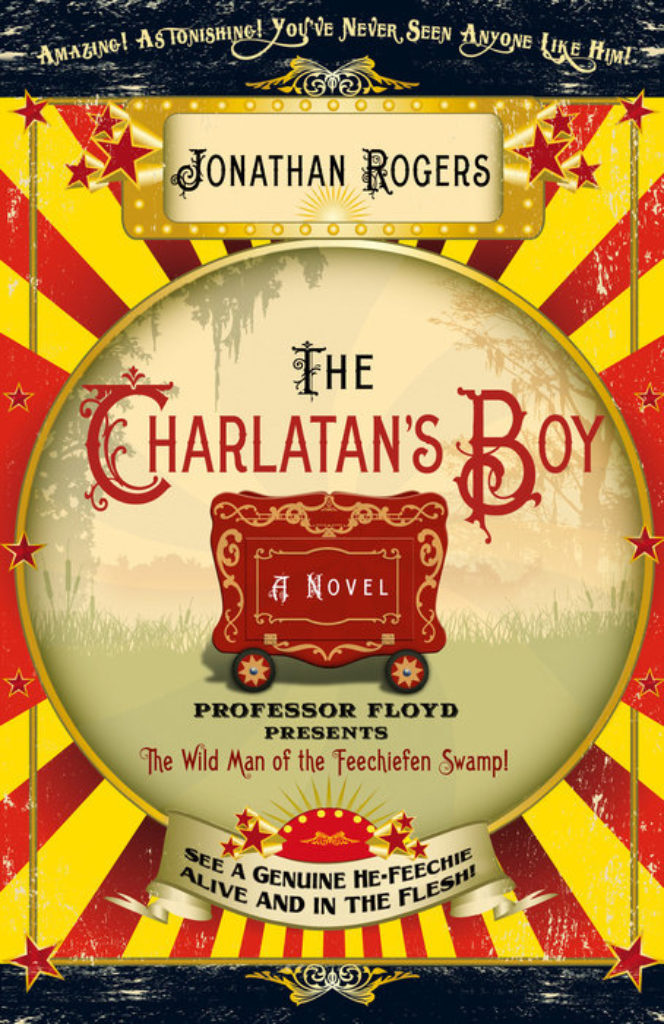The Charlatan’s Boy by Jonathan Rogers has been reviewed by Focus on the Family’s marriage and parenting magazine.

The Charlatan’s Boy by Jonathan Rogers has been reviewed by Focus on the Family’s marriage and parenting magazine.
Grady has spent his life traveling the Corenwald frontier with a huckster named “Perfesser” Floyd Wendellson. Grady’s origins are a mystery. Whenever he asks about his home or family, Floyd tells him a different story. Floyd draws crowds in the villages by promising to unveil a mythical swamp monster called a feechie. Grady sits in a cage, dressed in fur and mud, and makes noises at the proper times. He feels proud of his showmanship and is nearly convinced he is a feechie.
When people grow bored with feechies, Floyd decides to capitalize on Grady’s ugliness. Each time they enter a town, Floyd bets the villagers they can’t produce a young man as ugly as Grady. He wins for a while, until an even uglier boy is found. Having lost his money, Floyd spouts angry and belittling phrases at Grady. He tells him he is so ugly, even his own mother wouldn’t keep him.
Floyd cooks up other schemes. He and Grady pretend to be phrenologists for a while, reading the lumps on people’s heads. Along the way, a few kind women, including a barmaid and another traveling showgirl, try to help him escape Floyd and his transitory life. Grady is intrigued by the idea of settling down, but he thinks Floyd needs him. He also doesn’t think he’s civilized enough to live in a city.
Several years later, Floyd decides to revisit the feechie scam. He decides if people no longer believe in feechies, he must make them believe. He and Grady create crude machines that produce scary noises in the forest. They strategically scatter items like arrowheads around as evidence that feechies exist in the area. They travel with cattle drovers and fuel rumors about feechies among the men.
When the feechie scare has blossomed, Floyd starts their feechie sideshow again. This time, though, Floyd realizes he can’t appear to be a feechie sympathizer without getting the customers angry. He turns on Grady, allowing the onlookers to chase, attack and cage him with another supposed feechie about his age.
The other feechie (Tebo) stares at Grady for a while, then calls out with wild howls. Numerous other feechies appear and rescue them. Grady talks to Tebo and learns feechies are real after all. When they reach the hidden feechie village, Tebo introduces Grady to a feechie couple. The woman, Darlu, and her husband, Harvo, are astounded when Tebo proves Grady is actually their long-lost son, Cato. They had set him down under a bush for just a moment when he was 2, and he was gone when they returned. Grady learns he was always loved, wanted and missed. The feechies have a party to celebrate his return.
None
Grady’s parents mention praying for him after he went missing, though they don’t say to whom they prayed. A huckster named Reverend Clarence has a praying machine. Even Floyd is disgusted by dishonesty of that caliber.
Floyd is a huckster who makes a living playing cards and scamming others as a traveling showman. He keeps Grady around because he needs an assistant for his schemes, and he is sometimes emotionally abusive to the boy. Floyd keeps company with other traveling con men and cattle thieves. Grady’s real parents were devastated to lose him, and they welcome him home with delight.
None
None
Get free discussion questions for this book and others, at FocusOnTheFamily.com/discuss-books.
Lying: Floyd Wendellson deceives people to make money. Grady, as part of his show, lives a lie to help him make money.
You can request a review of a title you can’t find at reviewrequests@family.org.
Book reviews cover the content, themes and worldviews of fiction books, not their literary merit, and equip parents to decide whether a book is appropriate for their children. The inclusion of a book’s review does not constitute an endorsement by Focus on the Family.